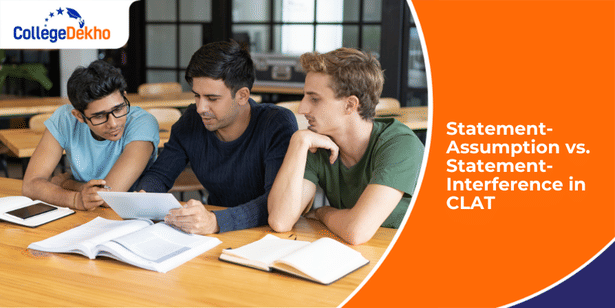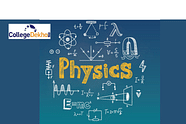
The key differences between Statement-Assumption vs. Statement-Interference in CLAT are many. While Assumptions are unstated premises or beliefs, Inferences are logical conclusions that can be directly drawn from the given statement or statements. Statements will be dependent on Assumptions and Inferences will be dependent only on statements. The statement will be collapsed if the Assumption is proven irrational, but inferences can be made from the statements alone.
Also Read:
How to Score 100+ in CLAT 2026?
Key Differences: Statement-Assumption vs. Statement-Interference in CLAT
Find the primary differences between Statement-Assumption vs. Statement-Interference in the CLAT exam below.
- An assumption is implicit and presumed and is never directly stated. These are a set of statements that are essential and obligatory for the information in the statement to make sense or hold true and reasonable. Inferences can be considered as logical deductions from the statements that are presented.
- The legitimacy and validity of the conclusion also depends on the assumption. It is also called the negation technique which holds that the statement will become invalid if the Assumption feels contradicted. Assumption is necessary for proving the reasonableness and rationality of the sentence. The statement would lose its meaning or effectiveness if the assumption is false. Contrastingly, Inference is assessed for the validity of the facts provided in a way that it will be deemed correct only if it cannot be contradicted or challenged by the statement and transcends the facts or information provided.
- The function of Assumptions is to provide an unseen assistance to the conclusion. It is a hidden belief that the speaker or author relies on. Inferences are regarded as conclusions that have been attained through logical deductions from the given facts.
- Questions based on Statement-Assumption are framed in a particular manner such as: "Which assumption underlies the statement?" or “Which of the following is an assumption on which the argument depends?”. The typical question pattern for Statement-Inference is: "What can be inferred from the statement?"
- Assumptions can be considered underlying beliefs or premises and no evidence is to be provided to solve Assumption questions; you can simply rely on your beliefs, previous knowledge, hypotheses, or generalizations to solve these questions. On the contrary, no previous assumptions, opinions, or acquired knowledge must be used to solve Statement-Inferences questions and you must solely depend on the data or facts provided in the statements.
- You will not be able to logically deduce assumptions from the statement itself or the information provided. Some new, unstated information must be introduced to obtain the same. On the other hand, inferences can be directly deduced from the given statements. No new information or external factors must be introduced.
- Assumption has the power to bridge the gap between premises and conclusions. It establishes a connection between the information provided and the assertion that is intended by filling in the missing links. However, Inferences do not perform any such function and are directly deduced from the statements provided.
- It must be noted that if an assumption is correct, it is usually represented moderately, not in an absolute or assertive manner with phases like “always” or “never”. But, these phrases are commonly used while drawing conclusions or inferences.
However, we can draw one analogy between Assumptions and Inferences. Statements and Assumptions are mutually exclusive of each other and they are never the same. The same applies to Statements and Inferences.
Also Read:
Tips to Prepare for Current Affairs Section of CLAT 2026
Are you feeling lost and unsure about what career path to take after completing 12th standard?
Say goodbye to confusion and hello to a bright future!

Was this article helpful?




















Similar Articles
Documents Required for MH CET Law Registration 2026
Can Final Year Students Apply for MHT CET Law 2026?
AILET 2026 Seat Allotment Process and Criteria Used
Documents Required for AILET 2026 Counselling and Admission
List of Documents Required for CLAT 2026 Counselling Process
CLAT 2026 Counselling Process Dos and Don'ts